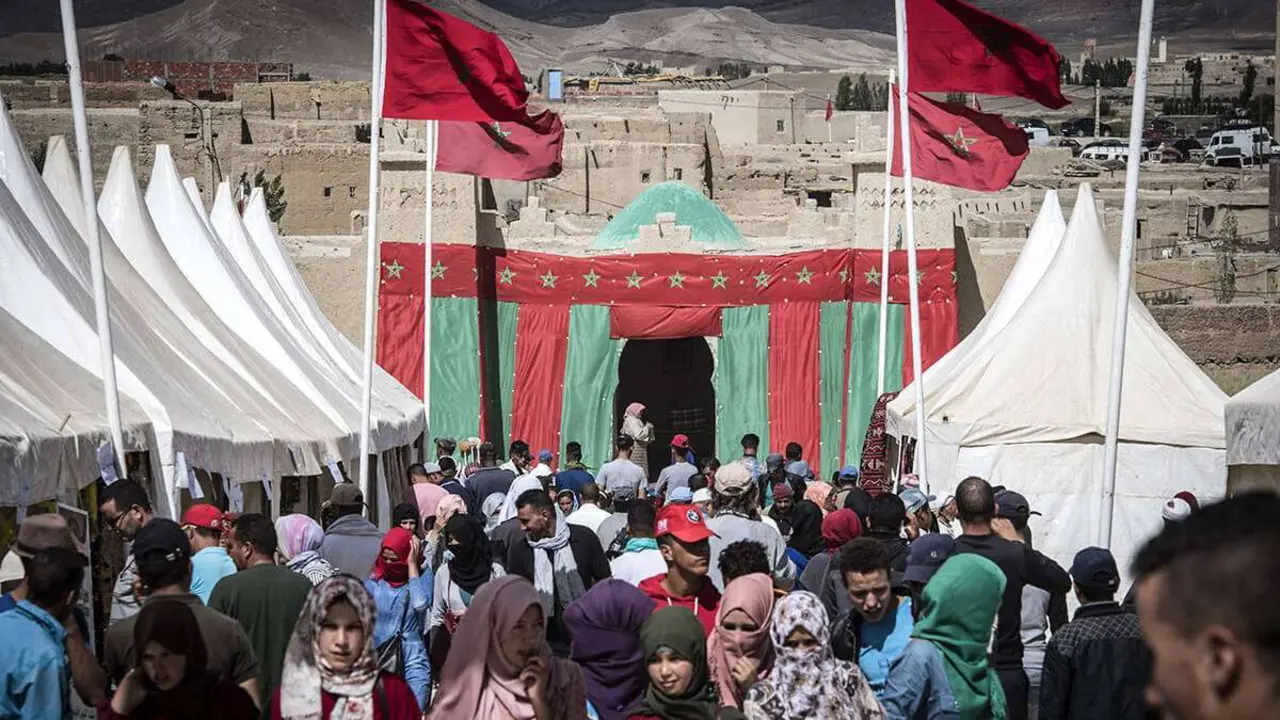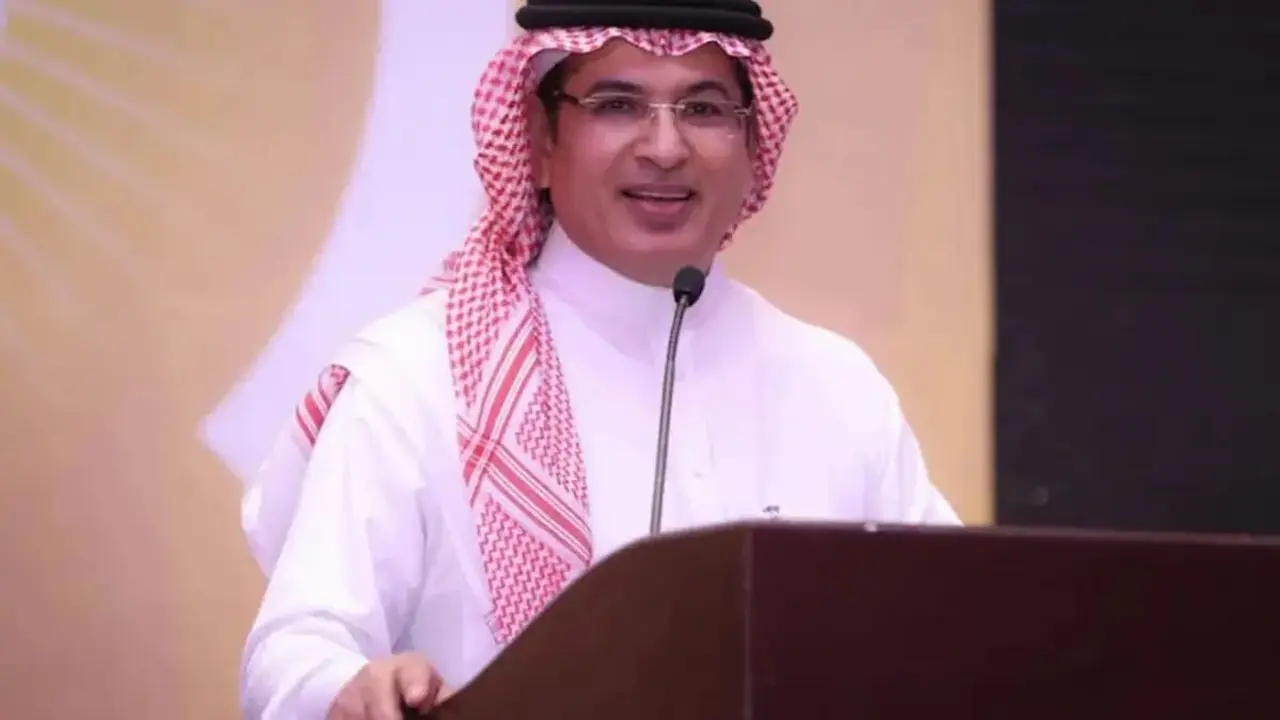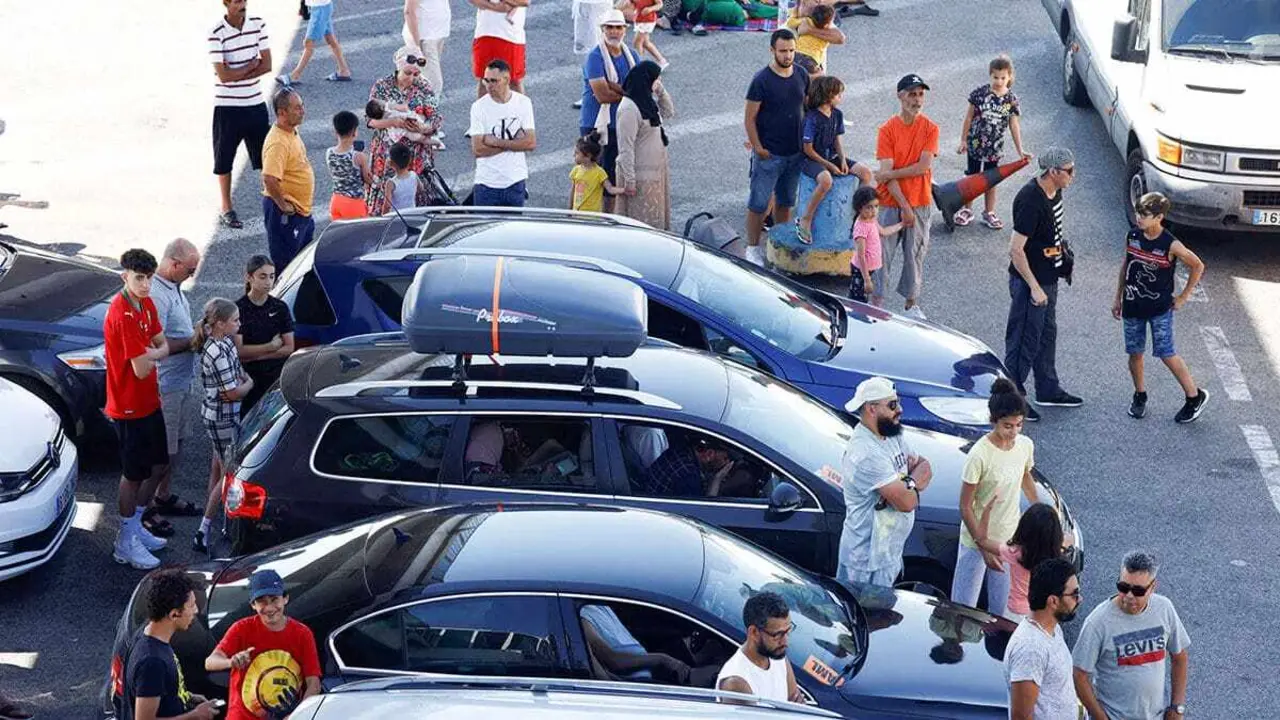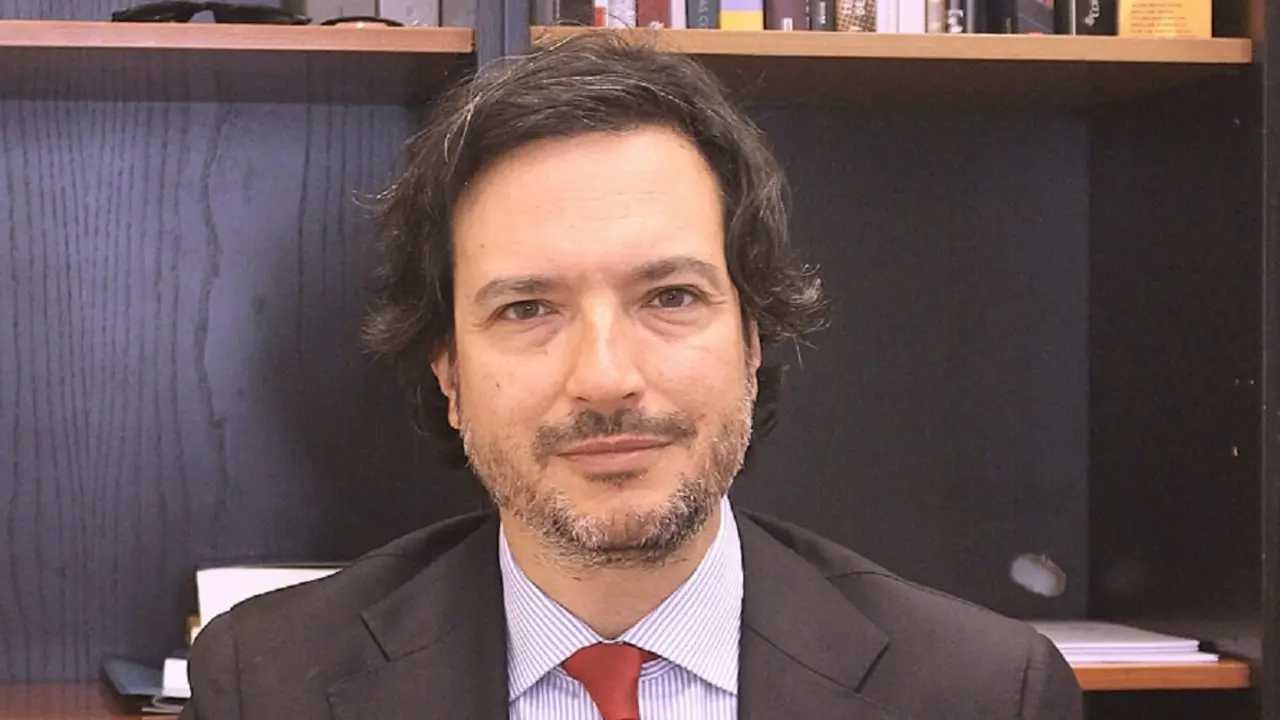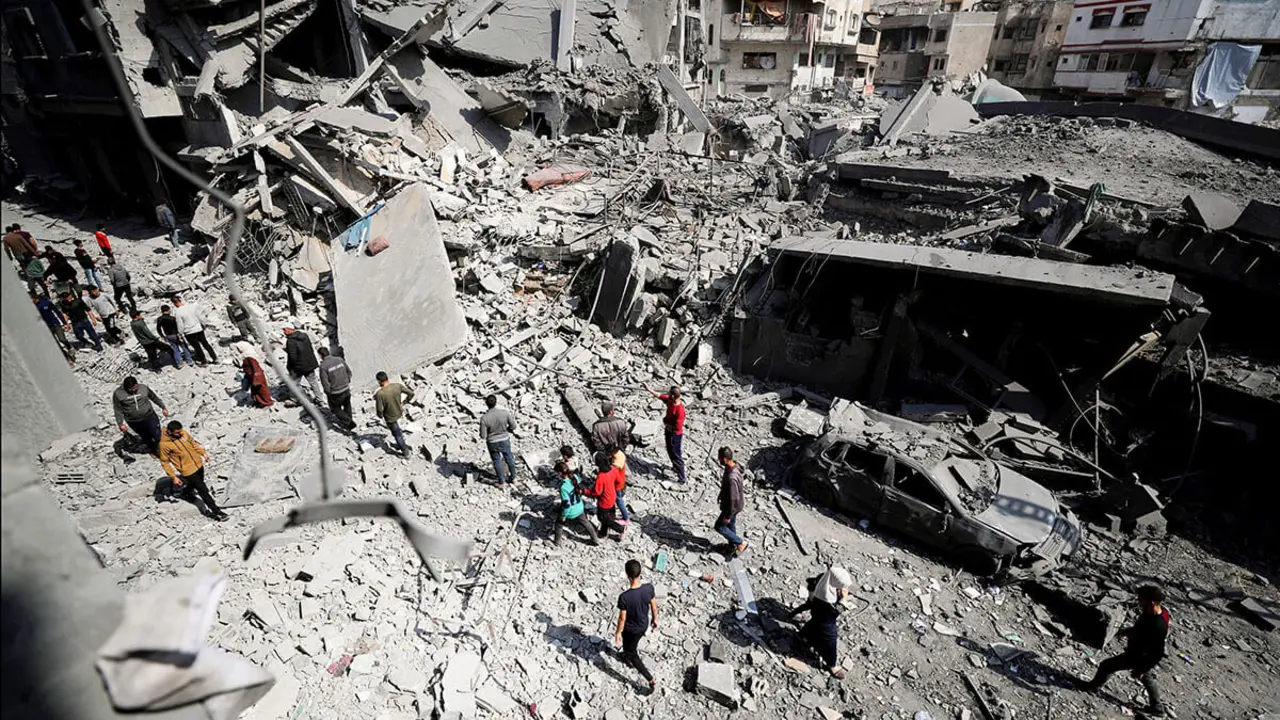Eva Orúe: "Journalism is a continuous process of astonishment and learning"

She walks calmly to the door of the Eugenio Trías Library in El Retiro, where we have arranged to meet for this interview. Until a few days ago, such tranquillity in this place and in the middle of the Book Fair was unthinkable. Logical, she is the director, the first woman in more than eighty years. This was her second edition after being chosen by the Booksellers' Guild, and there is still another one to come, then "we'll see". Eva Orúe is one of this country's great journalists. She has worked in different media, was a correspondent, among other destinations, in Moscow, where she was able to appreciate "Russian pride", a talk show host, author of several books... "Journalism is a continuous process of astonishment and learning", she says. And so it has been her professional career, "not at all linear" due to her own character, which has led her to do what she really likes: telling stories. "I am a person who is ambitious just enough and a good conformist," she says, and perhaps that is the secret of the serenity she transmits. Her passion: travelling... in her van.
A few days ago the 82nd edition of the Madrid Book Fair came to an end, and your second as director. What did you do the next day?
Back to the Retiro like a criminal returns to the crime (laughs). My team was there at 6:00 in the morning to start dismantling; I arrived later because I had a medical test. Most of the exhibitors came to empty the stands. This year we had two days to dismantle. When the fair is over, there is still work to do.
The result is fewer visitors, but many more sales. Can we interpret that people read more than we say or think?
That this is not exactly true is shown by reading studies. These studies say that Spaniards are not great readers, but also that children and teenagers read a lot, and that the percentage of regular readers is growing, albeit little by little. I am talking about books, because when it comes to reading, we read more than ever, albeit on screen. In the middle of the fair, what the exhibitors said, curiously enough, was that the rain did not discourage sales and that people were very active in their purchases. There have been fewer visitors than in other years, perhaps they were discouraged by the rain. We don't have data for each stand, but the children's book stands have had fewer visitors because they are more for families, for good weather. The occupancy rate of the pavilions with activity has been much higher than last year's edition and it should be noted that we have discounted the effect of rain, i.e. we do not count those who entered and left because of a storm.

This was your second edition as director. When you entered the competition, what was your challenge, and did you manage it?
I must confess that I had an idea far removed from the reality of what it was like to direct the fair. When you come, in my case as a journalist, working with authors or even as an author to sign, you get a partial idea of what it is like. In the end, the organisation is a lot of ironing, that is, a lot of assembly, a lot of water and electricity problems, and a lot of internal relations with the guilds that participate. The first year I joined in January, and the challenge was to get it off the ground and make it as good as possible. It wasn't easy to set it up in just three months, and even less so with a novice director and a recent pandemic, but the team proved their worth, some of them have been at the fair for almost 30 years, they know it like the back of their hands. There were few changes. This year we have introduced some changes, those that you don't notice such as the typeface for the signs and others that you do, in the stands, transparent pavilions that have allowed people to see what was going on inside and those of us who were at the events to see what was going on outside. You don't lose sight of the fair. We asked the booths to help us test a new system and now we are waiting for them to tell us what they think. The other day, the Swedish Embassy told me that the Nordic booth had worked very well. When I have the final report, we will see whether we will persevere or correct next year.
Next year, which is supposed to be your last year, would you like to continue or return to active journalism, talk show, new book...?
My contract is for three editions. The Book Fair is a very big thing, a very nice job. I'm already at an age when I'm thinking more about retiring than about resuming lost careers or embarking on new paths. Having said that, first of all it depends on who hired me: the booksellers' guild, whether they are happy with the work I've done; also on whether or not some things come out; and whether or not I want to continue, because it's a lot of work. I don't know, maybe it's just a hopeful we'll see. Whatever it is, I would like to arrive at the next edition with the decision taken on both sides.
We've talked about reading: traditional book, digital book, audiobook? If you have to choose...
Without a doubt, the book. I always carry one, even if it's heavy, except when I travel. What I always read in e-book are books in English or French for a very simple reason: the dictionary. When there's a word I don't know, I put my finger on it and it translates it for me. I read worse in the e-book, I know less, and it's hard for me to retrieve something I've read before. I think it's generational. I started reading the paper book and I will die reading the paper book.
A friend of mine was telling me happily that there was an application that writes and tells stories. Are we going to know how to handle Artificial Intelligence?
Oh, my God (laughs). We're heading towards that, it's obvious. I'm of an age, once again, that maybe I don't see that future. The only thing I aspire to is to be told exactly who is behind it. I can think that there is an artificial intelligence conveniently fed by human beings that writes a novel, a story or a poem, and that I might like it, why not? But I want to know if it has been written by a machine or a human being. It seems wrong to cheat. I recently saw a winning photograph in a competition, it was made with Artificial Intelligence, it was a prodigy, but part of the instructions had been given by a person... Fortunately, I don't think I'm going to get that world (laughs).
Speaking of age again... If you could go back to your yesterday, what wouldn't you do and what would you like to do that you haven't done?
To put it positively, everything I've done has served me well and, of course, I've messed up and I've had jobs I didn't like and I've changed..., but, without all that, I wouldn't be here and I wouldn't be the way I am. I started working when I was 19. I have been working and paying contributions for many years. Fortunately, and this has to do with my character, I have not had a linear career. I understand that there are people who go down a path and prosper. My path, in reality, is a continuous zigzagging. I like to let myself go, sometimes it worked out better and sometimes worse, but in general I've been lucky. What would I like to do? I'd like to take my van and run away (laughs).

From everything?
Almost everything. There's nothing I love more than getting on the road. I love to travel, to go to places I don't know and not on the beaten track. I love going with my partner and getting lost without having to explain myself to anyone.
We go back to your time as a correspondent, to Moscow. To your book "Russia at the crossroads", written with Sara Gutiérrez in 1997. What do you tell us about that Russia and today's Russia at war with Ukraine?
I recently reread part of the book because I'm working on a project that takes me back to Russia and, to my surprise, there are things that don't make sense, data that don't count, but a good part of what is happening now is there, because - and nobody should understand this as a justification for the war because nothing justifies the invasion in any case - the germ of everything is in Putin's early years. In September I will interview Giuliano da Empoli, an Italian political scientist living in France who has written the essay "The Engineers of Chaos" and the novel "The Wizard of the Kremlin". It tells the story of an alleged Putin advisor. When you read it, I think that many of these behaviours and attitudes were already there. He also explains that, in the Yeltsin era, which I lived through in Russia, the foundation was laid on which Putin has built his "soft diet" or call it what you will.
So the invasion didn't take you by surprise?
When I lived in Russia, I went with nothing and without knowing a word of the language. I started working with a Russian journalist who was also an interpreter. I remember asking him, insistently, why are you doing this? Why are you doing that? Why here or there? His answer was always: "Because this is Russia and we are a great power and we act like this". This pride is not the only explanation, but it is a good part of the explanation. It is the pride of a country that knows it is a great power and knows it has been mistreated by the West, which probably did not miss the opportunity to humiliate the collapsed colossus. Putin, in power, I don't know if he arrived with a preconceived idea, but if not, he understood it at once and recovered that Russian pride. Exacerbated nationalism is a fundamental part of Putin's mandate and of the recovery of a country that lived through Yeltsin and his neoliberal policies, the creation of mafias and the brutal impoverishment of generations of people who had lived thinking they were building a better future... The people needed a flame and Putin has raised it with great success for his project.
Another of your books: "The Second Chance". How many chances must one give and should one give oneself?
All of them. I don't like the kind of speeches that you have to fail to succeed. I don't think it's like that and I don't like self-help books either, this one isn't, that put the burden of proof on the individual. I believe that, if you have been lucky in life, you have had merit for that luck, but you have probably enjoyed other circumstances: family, being born here and not in a country with worse conditions, health... Not everything depends on the individual, but what I firmly believe is that we should not let ourselves be discouraged and that, indeed, we fail and we get back up again. I was commissioned to write this book at a time when I had just been fired from a digital newspaper. We all need a second chance. There are people who make the most of it and people who don't. To think that those who succeed do so only because of their many merits and that circumstances have nothing to do with it is a discourse that doesn't fit reality.
You have always defended and rescued women. Of course we have made progress, but what would you highlight that still needs to be achieved?
Reconciliation. I, who don't have children, am amazed when I hear people talk about work-life balance as something that only concerns women. For my mother, who didn't work, it was much easier than for mothers today. It has to do with education. Women still have a kind of extra burden that we take on, I don't know if we like it, but with a certain inevitability. If there are children, we have to look after them more, we go to meetings with teachers, to extracurricular activities, we take them to the doctor... That's what I see around me. Men haven't changed, and women continue to take on this work. When I went, because they didn't send me, as a correspondent to London, the women correspondents were single. I didn't meet any female correspondent who left Spain dragging her husband and children with her, but the other way around. Luck, birth, education, your circumstances, your health play a role in life, because in the development of women the same thing happens, if there is no conciliation it is very difficult and it has to be so that men and women share the task; for this, social structures have to help.
How would you define the situation we are living in internationally, nationally and personally?
I would say that I live on an island of calm personally, compared to the turmoil that surrounds us in all areas, whether we are talking about international politics, the economic situation, future challenges such as Artificial Intelligence... The feeling I have is that the ground is constantly shifting under our feet. What happens is that, at my age, my position and my life expectations probably matter or affect me less than a person with five children or a mortgage. I am privileged.
Do you talk about age again, does the passing of time weigh you down?
I'm getting older and everything weighs on us a little bit. My mother died in December, suddenly you think you are in the front line. In my family I'm the oldest and therefore I should be the next. I haven't had a midlife crisis. I am a person who is ambitious just enough and a good conformist. I don't know if it's a good thing, but that's the way I am. If tomorrow they told me that you were no longer the director of the Book Fair, I would still feel hurt, but believe me, it would last me 24 hours. My ambition is not to appear or to be in a position of public responsibility; if I am, I try to live up to it. Life is not only about what you do now. When I turned 30, this is a little story, I had a kind of crisis, it was 1992, I had been a correspondent for three and a half years and I left everything, and I went travelling. People told me I was crazy, that I was going to get bored. I don't remember being bored for a single minute in the six months I was with a rucksack on my shoulder. I don't know if it's courage, but I'm sure that there are other lives. I don't mind wasting time and, in certain circumstances, that works in my favour.

Journalism has changed a lot. In spite of everything, would you say, like García Márquez, that it is the best profession in the world?
For me, without a doubt. Journalism, at least the journalism I have practised, has been a journalism that is not confined to a single section or newsroom. I started in programmes, I did news programmes, but I never worked in a newsroom, I have never done political reporting in Parliament, but I have been on talk shows. It is the closest thing to being an actor, that is, to living several lives, and I am grateful for that. My years as a correspondent were seven master's degrees; the three years in Russia, I experienced things I could never have experienced, and I owe that to journalism, or at least to the practice of journalism. There is something very beautiful about journalism, which is that you are not a specialist. My grandmother used to say: "Apprentice of everything, master of nothing". I am very much like that. A correspondent in Paris will give you the option of covering the Cannes Film Festival, then going to Paris and doing and broadcasting the final of Roland Garros, I covered a NATO summit... and you do everything as if you know, but in reality journalism is a continuous process of astonishment and learning. For me, journalism as I have experienced it has been about learning. Learning what I saw learning and learning again. And in the case of correspondents, to tell what I was seeing. Now, with the Internet, this has lost its value, but at a time when few people had lived in Moscow and there were no social networks or Wikipedia, telling what you were seeing seemed to me to be the best job. I think I'm a good journalist at that, at telling what I see, but I've never been a good investigative or current affairs journalist. I've never been interested in that part.
Of all the moments you have experienced, tell me one key moment in your journalistic career.
I have experienced so many. The catastrophe in a stadium in Great Britain where more than 80 people were crushed to death; the death of Lady Di in Paris; the bombing of the White House in Moscow... When I was in Moscow, the 50th anniversary of the end of the Second World War was celebrated. We correspondents were there, as well as special envoys from Madrid, because Felipe González had come to take part in the celebrations. I remember being in the Metropol Hotel with my colleagues. It was the halibut crisis with Canada. It was also the negotiation of the Toledo Pacts, which seemed medieval or Visigothic to us correspondents at the time, we had no up-to-date information, no daily newspapers or radio, nothing, and the media sent journalists to ask Felipe González questions. So I thought there were two types of journalism. I am certainly on the less informative side, but on the side I like.
Let's finish. I know that among your passions is travelling. If you could pack your bags this afternoon and leave, what would be your destination?
I would say passion. I would go with my van, I don't even need to pack, I have it loaded with casual clothes and even cans (laughs). It's a house van. Small, with a bathroom, kitchen and I carry sweatshirts and trainers. I have a trip pending: the northern European coast, from Coruña to the Baltic republics. I hope to do it one day. I would also go with my van to the beach of Merón, near San Vicente de la Barquera, which is the closest thing to paradise. And I plan to go to Costa Rica. I'll go in the summer. I hope.


